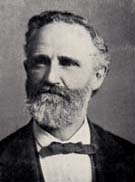3 Dec. 1835–19 May 1912

Richard Henry Battle, attorney and civic leader, was born in Louisburg, Franklin County, the son of William Horn and Lucy Martin Plummer Battle. His father was a justice of the North Carolina Supreme Court. He was descended from Elisha Battle, a member of the conventions that adopted the 1776 constitution and the federal Constitution. His maternal grandfather was Kemp Plummer, a lawyer. A brother, Kemp Plummer Battle, was president of The University of North Carolina.
Following his education at Mrs. Eliza Taylor's school in Raleigh and the preparatory school at The University of North Carolina, Battle entered the university. In June 1854 he was granted his A.B.; in 1858 he received the LL.B. Years later, in 1895, his alma mater honored him with an LL.D.
Battle served as tutor of mathematics and Greek from 1854 to 1858. During this time he read law with his father, who was professor of law in Chapel Hill. Battle was licensed to practice law and opened his office in Wadesboro in December 1858.
Battle entered the Civil War first as a lieutenant in Company I, Forty-third Regiment, North Carolina Troops, becoming quartermaster of the regiment in 1862, with the rank of captain. He resigned to join the staff of Zebulon B. Vance as private secretary, a position he held until August 1864. From then until 1865 he was auditor for the state.
Battle practiced law after the war, first forming a partnership with Samuel H. Phillips, with whom he practiced until December 1868. He, his father, and his brother next formed a partnership under the firm name W. H. Battle and Sons. Still later, in January 1876, he and Samuel F. Mordecai practiced together under the partnership name Battle and Mordecai.
During the administration of Governor Alfred M. Scales, Battle was urged to accept appointment as a superior court judge, an offer he declined. He was a member of the constitutional convention of 1875 and of the state house of representatives in 1880. He was a member of the state democratic executive committee serving as chairman from 1884 to 1888, and was an alderman of the city of Raleigh in 1880.
In addition to political posts, Battle assumed many civic responsibilities. From 1879 to 1912 he was a trustee of The University of North Carolina; in 1891 he was secretary-treasurer of the board. He was noted for work leading to the establishment of Rex Hospital and for his service as president of its board of trustees. Battle also was a long-time president of the Board of Trustees of the Olivia Raney Library in Raleigh; president of the trustees of the Raleigh Cemetery Association, which established Oakwood Cemetery; president of the trustees of Raleigh Associated Charities; a trustee of both St. Mary's and St. Augustine's schools in Raleigh; and both president and vice-president of the advisory board of the North Carolina Agricultural Society.
When the bronze statue of Zebulon B. Vance was unveiled in Capitol Square in Raleigh in 1900, Battle delivered the address. The cornerstone of the "new" Rex Hospital on South Street was laid in January 1909 with Battle the featured speaker. He prepared several sketches for Ashe's Biographical History of North Carolina.
A member of the Protestant Episcopal church, Battle was a regular and faithful communicant, serving as a vestryman of the Chapel of the Cross in Chapel Hill from 1855 to 1858, of Calvary Church in Wadesboro from 1861 to 1862, and of Christ Church in Raleigh from 1863 to 1874; he was elected senior warden of the Church of the Good Shepherd in Raleigh on 26 Feb. 1874, having been one of the leaders in its establishment. For many years he served as deputy to the General Convention of the Episcopal Church in the United States.
Battle married Annie Ruffin Ashe, daughter of Confederate Senator Thomas S. Ashe, on 28 Nov. 1860; she predeceased him by nearly nineteen years. The Battles had ten children, four of whom survived him.
Several weeks before his death, Battle suffered a slight stroke; he was hospitalized in Rex Hospital for ten days preceding his death. His funeral was conducted at the Church of the Good Shepherd in Raleigh, with burial in Oakwood Cemetery. Through provisions of his will, Battle continued his expression of loyalty to the Church of the Good Shepherd, The University of North Carolina, and the Olivia Raney Library.